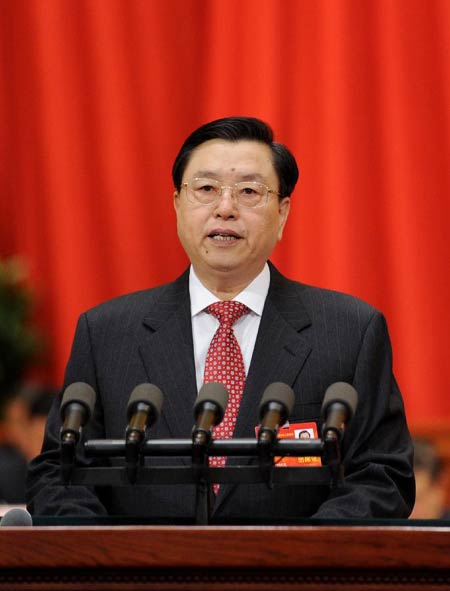 Large Medium Small
Large Medium Small
 |
|
Zhang Dejiang, chairman of the Standing Committee of China's National People's Congress (NPC), delivers a work report of the Standing Committee of the NPC during the second plenary meeting of the second session of the 12th NPC at the Great Hall of the People in Beijing, capital of China, March 9, 2014. [Photo/Xinhua] |
BEIJING - China will better combine legislative decisions with reform decisions, to allow legislation to fully play its role in guiding, spurring and guaranteeing reform, China's top legislator said on Sunday.
According to Zhang Dejiang, chairman of the 12th National People's Congress (NPC) Standing Committee, the year 2014 is the first year for implementing the Communist Party of China (CPC) Central Committee's decision to comprehensively deepen reform, and is crucial for completing the 12th Five-Year Plan.
This year, the NPC Standing Committee will revise the Budget Law to put in place an open and transparent budgeting system, and the Administrative Procedures Law and the Law on Administrative Review to better protect people's rights and interests, Zhang said in a draft work report submitted to lawmakers for review.
Regarding environmental protection, the top legislature will revise the Environmental Protection Law and the Air Pollution Prevention and Control Law to improve the environmental protection and management system.
Emissions of all pollutants should be supervised strictly, and the strictest systems should be enforced to protect the environment by controlling pollution at the source, holding polluters accountable for the damage they cause and having them compensate for it, Zhang said.
A wide range of other laws concerning public interests, including the Food Safety Law and the Education Law, will also be revised, whereas the Asset Evaluation Law, the Waterway Law, the State Medals and Honorary Titles Law, the Futures Law, the Grain Law, and the Chinese Medicines Law will be enacted, Zhang said.
The NPC Standing Committee will also work to further improve legislation quality in the coming year, he said, adding that "the quality of legislative work directly affects how well the rule of law is implemented."
Recalling the work of the NPC Standing Committee over the past year, Zhang said the Standing Committee took new steps in the work of the NPC, and ensured that its work got off to a good start.
He said the NPC Standing Committee enacted the Tourism Law and the Special Equipment Safety Law to promote sustained, sound development of tourism and ensure safety during manufacturing and operation process.
It also revised the Law on the Protection of Consumers' Rights and Interests to maintain market order and safeguard consumers' legitimate rights and interests, and the Trademark Law to streamline the trademark registration procedures and improve protection for famous trademarks.
In addition, the Standing Committee deliberated draft revisions to the Environmental Protection Law twice in the past year, Zhang said. He said prominent environmental problems, such as air, water and soil pollution, are of great public concerns but stressed that protecting the environment is an urgent and complex task that requires long-term efforts.
The draft of the Asset Evaluation Law and the draft revisions to the Administrative Procedures Law, the Military Facilities Protection Law and the Law on Production Safety were also deliberated by the NPC Standing Committee.
Moreover, Zhang said the Standing Committee adopted timely decisions and resolutions to ensure major reforms of the country are carried out in a law-based, orderly manner.
Its implementation of the Plan for the Reform of State Council Bodies and the Transformation of Their Functions further streamlined administration and delegated more power to lower-level governments, invigorated economic and social development, and ensured that the market plays a decisive role in allocating resources, Zhang said.
It abolished legal documents on reeducation through labor, and passed a resolution on family planning to allow couples to have two children if either parent is an only child.
It also approved two new national days, namely the Victory Day of the Chinese People's War of Resistance against Japanese Aggression and the National Memorial Day for Nanjing Massacre Victims, to commemorate Nanjing Massacre victims and all those killed during Japanese aggression against China and promote patriotism.
In total, 15 bills and draft decisions on legal issues were deliberated by the NPC Standing Committee, of which ten of them were passed. A total of 21 laws were revised and two were enacted.
Zhang said the NPC Standing Committee had worked vigorously to make legislation more scientific and democratic and raise their quality over the past year, by making laws more enforceable and practicable, exploring ways to assess laws before their promulgation, and improving the mechanism for promulgating draft laws for public suggestions.
It also ratified four treaties or agreements with foreign countries or international conventions that China concluded, and made decisions on and approved the appointment or removal of a number of employees in state bodies.
However, Zhang admitted that there is still room for further progress.
"We are keenly aware that the work of the Standing Committee still falls well short of the expectations of the people and the demands of deputies," he said.
"We will willingly accept the oversight of the people, listen to the views of deputies with an open mind, and get the NPC and its Standing Committee to better play their roles," Zhang said.